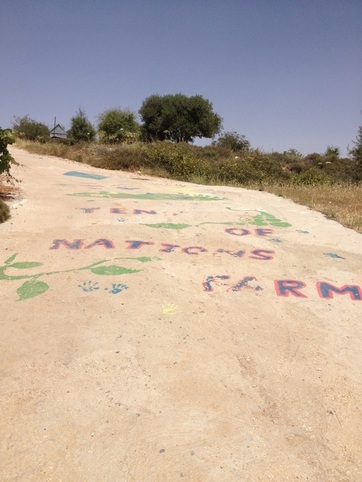|
Last night (on our very last night) we had a final picnic with the group in Jerusalem. We cooked, we laughed, we sang, we got awesome swag. Thank you for a life changing, reality shifting, movement building, powerful 5 months. We know that we will see you all soon as we move forward in our work toward justice, peace, and self-determination.
0 Comments
 Entrance to the Tent of Nations farm. (Via Rabbis for Human Rights) Entrance to the Tent of Nations farm. (Via Rabbis for Human Rights) This article originally appeared at the Rabbis for Human Rights site where additional images are also available. Two weeks ago, the orchards at the Tent of Nations, a much beloved Palestinian owned educational and environmental farm outside of Bethlehem dedicated to understanding, reconciliation and peace, were demolished by the Israeli authorities. Despite reportedly having no legal standing, 1500 fruit trees were destroyed during the early hours of the morning on May 19 2014. Valerie Rourke Miller, a volunteer at the farm and a participant of Achvat Amim-Solidarity of Nations, gives her reflections on the incident. Reflections on an Agricultural MassacreBy: Valerie Rourke Miller The dogs barked that night. They howled over the sounds of a mechanized destruction as the sun began to rise over the hills of Palestine. No one thought much of it, as they slept through the racket. The barking they had grown accustomed to, sleeping snugly in their caves at The Tent of Nations. The Tent of Nations farm lies a bit south of Bethlehem on a hill top surrounded by Israeli settlements. The rocky, sloped fields are not only the sight of Daher’s Vineyard Farm, but also house the growth of hope, education, and resistance. The 100 acres cultivates olive trees, fruit trees, and grapevines, but also works as an educational hub for local adolescents and international activists. Since 1991, the land has been under the threat of Israel’s seizure. That morning, as the family and residential volunteers shared coffee, a phone call brought in the news of what the dogs had been barking at. Down in the valley four fields lay in ruins, the bulldozer tracks fresh on the newly leveled earth. Yesterday, these fields had stood bursting with ripening fruit. In fact, it would be the first season these trees would bear fruit after years of cultivation. Now, they were only mass graves. |
News and UpdatesWe'll post updates about the program, interesting news and conversation starter here. Archives
July 2024
|
